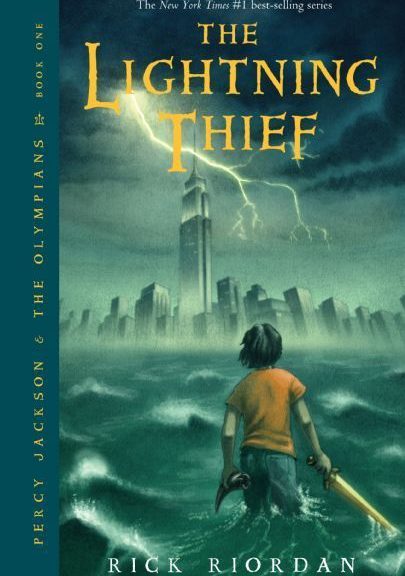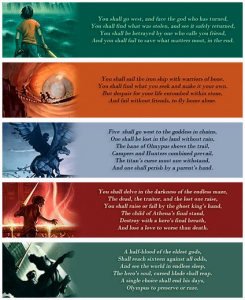
The Lightning Thief
By Alan Cohn
Rick Riordan is a New York Times bestselling author of over twenty novels. He is known for mythology-based book series like The Kane Chronicles, Magnus Chase and the Gods of Asgard, and Percy Jackson and & the Olympians. I have been well versed in Rick Riordan’s books since middle school. If I remember correctly, I started reading them because I needed something to do during my library period. Back then I was, and even now I am, a big fan of fictional works of all kinds, so I thought that the Percy Jackson books would be interesting to read. Once I read the first book, I was immediately on the Rick Riordan bandwagon, and it started my interest in mythology. I began to make it a point in my life to keep up with Rick Riordan’s books because I found it interesting to see how he brought different myths and gods in his books to life. I think Rick Riordan brings an exciting twist in the hero epic genre.
Percy Jackson and The Lightning Thief is the first of Rick Riordan’s books on mythology, and it acts as the foundation that leads to the rest of the books. This book begins with a twelve-year-old boy named Percy Jackson going on a field trip that will unexpectedly change his life forever. On this field trip, Percy’s math teacher becomes a harpy and tries to kill him because she believes that he has stolen the lightning bolt from Zeus. Percy fights off the harpy and ends up at a demi-god summer camp where he learns that he is Poseidon’s son; because of this relationship, monsters and other gods like Hades believe he has the lightning bolt. This leads Hades to kidnap Percy’s mom, and Percy must go on a quest to the underworld to save her.
Throughout the book, Percy has many problems he has to face, like saving his mother and how he will have the ability to kill the multitude of monsters that he encounters on his quest. Still, this story’s central problem is the recovery of Zeus’ stolen lightning bolt before the gods go to war and wreck the earth in the process. A theme that fits with this world-destroying central problem is heroism/courage. I say this because, in this fictional world of gods, Fate and Destiny are two significant players, so the quests that heroes go on are based on a given prophecy for the quest. The prophecies provided for quests tell of future events that relate to certain people. Because of this, those specific people must go on that quest to ensure that the quest is successful, even though bad things may occur to them. This connects with the theme because the narrator of the book, which is the character Percy, is told that he is the only one that can retrieve what he thinks is the lightning bolt to save the world. This is a lot for a twelve-year-old, so not only does he have to find the courage to deal with the changes in his life, but he also has to find the courage to deal with the future that is prophesized to him. If he doesn’t find the courage he needs, he will not become the hero the world needs.

The books’ prophecies are given as riddles that are always sketchy in the details, and you don’t know the true meaning of the prophecies’ lines until the moment before the described event happens. The prophecy in this book states, “You shall go west, and face the god who has turned. You shall find what was stolen, and see it safely returned. You shall be betrayed by one who calls you a friend, and you shall fail to save what matters most, in the end.” The prophecy fits with the theme and central problem because of the mixture of the lines’ known and unknown meanings. I believe that Riordan uses the first-person narration of Percy to show his uncertainty in the future. Riordan makes Percy a dramatized agent narrator to show his thought process and feelings about his interpretations of the prophecy’s lines. An example of this is when the book shows Percy’s interpretation of the prophecy’s last two lines.
In the book, Percy narrates the lines that he hears from the Oracle. He recounts the end of prophesy, which “delivered the worst line of all: And you shall fail to save what matters most, in the end.” Percy cries, “Wait! What do you mean? What friend? What will I fail to save?” But the oracle’s “mouth closed tight, as if it hadn’t been open in a hundred years.” From these two lines, Percy has shown us his uncertainty and fear of the future. You can tell from his wording and actions that he believes that he will fail at saving his mother. The prophecy fills Percy with fear because not only does he know he will be betrayed by a friend, but he may not be able to save the one real reason he is going on this quest: his mother. However, even with all this fear and uncertainty, Percy still finds the courage to have hope that things will go well. Throughout the book, Percy finds the courage to go, continue his quest, and not let the future frighten him so he can save the world.
Even though in the real world we don’t have to fight gods and monsters like Percy Jackson, I still believe that there is a moral lesson to this story that we can use in our everyday lives. That lesson is that it is hard to face what the future has in store for us. As humans, we are sometimes afraid of what the future holds, and an excellent example of this is the time we live in now. We are currently living in a world with a pandemic, riots, fires, and an upcoming election. Because of these events, people are uncertain or afraid of what will happen in the future. However, here we are still moving forward because most of us still find the courage to do so. If we didn’t find the courage to move forward, we would probably be in a worse situation–a situation of people hiding in their homes afraid of the outside world or just mass hysteria with even more riots. And the only reason these situations have not happened is that people have the courage to continue hoping the future will be better like how Percy believes that everything will work out in the end.
I immensely enjoyed this book, and I highly recommend it to others. I believe that Rick Riordan does well in making the reader contemplate what will happen next in each book with their corresponding prophecies and how the whole series will end with a significant overall prophecy if you continue to read each book. He makes the prophecies more complex as the characters continue to develop their abilities. With his book series, Riordan has created a complex world of magic with different mythologies that are connected to one another, so I sincerely hope that you read the stories of this complex world of heroes being thrown in various realms of the gods.